Cultural Activities
- Stage plays
- Street plays
- National level art camp
- Literature
- Neladani community radio Station
Stage plays
Stage plays is yet another popular medium of fine art providing wholesome entertainment, and also can effectively portray social problems and can deliver message to the audience for improvement and reforms.
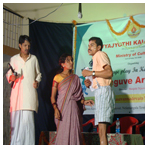 On 23rd January 2009 the stage play Kanjoos Ganda Dildar Hendathi was enacted at Basavanna Devara Mutt Kala Mandira by Divyajyothi Kala Kendra Artists. The play depicts the family relations, the father being after money whereas the daughter, son and mother, were against the fathers concept of accumulation of money. In total the theme of the play is to communicate the unity of the family depends on the discussion and transparency. The mother was after the modern things and articles whereas daughter followed the mother and she is after the camera. Similarly the son faked and taken money from the mother for using it in an unproductive way. The son becomes a waster, there was tension in the family, the father came to know the underline motives of mother and daughter, and he wants to through them away from the house. The intervention of a friend was absolutely appropriate, the friend advised the father not to throw away the daughter and mother since they would amputate from the family. Realizing this the father adhere to the friends advise and did not throw the family away. The moral of the story is one should not have undue desire for money similarly for articles and modern things. Apart from this the family if required to be one and united they should be discussion among the family members and transparency among them. The play was witnessed by over 750 members of the community.
On 23rd January 2009 the stage play Kanjoos Ganda Dildar Hendathi was enacted at Basavanna Devara Mutt Kala Mandira by Divyajyothi Kala Kendra Artists. The play depicts the family relations, the father being after money whereas the daughter, son and mother, were against the fathers concept of accumulation of money. In total the theme of the play is to communicate the unity of the family depends on the discussion and transparency. The mother was after the modern things and articles whereas daughter followed the mother and she is after the camera. Similarly the son faked and taken money from the mother for using it in an unproductive way. The son becomes a waster, there was tension in the family, the father came to know the underline motives of mother and daughter, and he wants to through them away from the house. The intervention of a friend was absolutely appropriate, the friend advised the father not to throw away the daughter and mother since they would amputate from the family. Realizing this the father adhere to the friends advise and did not throw the family away. The moral of the story is one should not have undue desire for money similarly for articles and modern things. Apart from this the family if required to be one and united they should be discussion among the family members and transparency among them. The play was witnessed by over 750 members of the community.
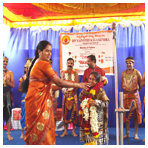 Another play titled "Naguve Arogya" enacted by the cultural team of Kala Kendra. The theme of the play is based on the differentiation in the society's ailments of people and laughter would cure all the maladies which sprout from the differentiation in the society. The play goes on ….."Life is wonderful but life is full of ups and downs. In life and the family there are short comings and odds are prevalent. It is important to note such short comings would frustrate individuals who go through it." Through this play, the message given was, if one has to be away from these maladies there is one medicine which would keep away from these maladies and such medicine is on hand. That medicine we have ourselves it is laughter. Where ever laughter prevails good health prevails also. This truth was expressed by the elders and persons with experience because of that we should laugh and make others also laugh. This brings is good health and also others who are surrounded us since they also laugh along with us. As a part of stage play Naguve Arogya the importance of job and the family more specifically about the bride was interlude in the main play, an unemployed goes to see a bride but the hand of the bride was not given since he does not hold a job. He joins the army as a soldier and goes to the same family and asks for the bride and he was given the bride.
Another play titled "Naguve Arogya" enacted by the cultural team of Kala Kendra. The theme of the play is based on the differentiation in the society's ailments of people and laughter would cure all the maladies which sprout from the differentiation in the society. The play goes on ….."Life is wonderful but life is full of ups and downs. In life and the family there are short comings and odds are prevalent. It is important to note such short comings would frustrate individuals who go through it." Through this play, the message given was, if one has to be away from these maladies there is one medicine which would keep away from these maladies and such medicine is on hand. That medicine we have ourselves it is laughter. Where ever laughter prevails good health prevails also. This truth was expressed by the elders and persons with experience because of that we should laugh and make others also laugh. This brings is good health and also others who are surrounded us since they also laugh along with us. As a part of stage play Naguve Arogya the importance of job and the family more specifically about the bride was interlude in the main play, an unemployed goes to see a bride but the hand of the bride was not given since he does not hold a job. He joins the army as a soldier and goes to the same family and asks for the bride and he was given the bride.
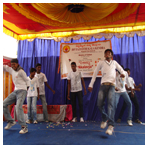 The theme of the play, which is an offshoot of the main play as follows. India is our country and we are proud of it. It is wise to ask what we have done to the country than what country has given to us. Through this play the message and awareness given to the audience is that "it is not possible for us to give to the nation but individually or personally but we could encourage people who fight for the nation and who toil for the country. It was earlier that the bride was not given to soldier but the message through this stage play at the end that the girl would be given to the soldier as a bride since the soldier fights for the country and holds a job. The importance of soldier is stressed upon the play. The country had leaders like Mahatma Gandhi, Jawaharlal Nehru, Kittur Rani Chennamma, and Subhash Chandra Bosh who fought for the country's independence and we are all peaceful at this stage because of their fight. The soldier who guard the independence for us are praise worthy. We should encourage and make them feel proud of them the country should encourage them by offering medals and promotion for their dutiful life. Final message of the play is that to encourage the soldier by appreciating them who guard the territory and country for us.
The theme of the play, which is an offshoot of the main play as follows. India is our country and we are proud of it. It is wise to ask what we have done to the country than what country has given to us. Through this play the message and awareness given to the audience is that "it is not possible for us to give to the nation but individually or personally but we could encourage people who fight for the nation and who toil for the country. It was earlier that the bride was not given to soldier but the message through this stage play at the end that the girl would be given to the soldier as a bride since the soldier fights for the country and holds a job. The importance of soldier is stressed upon the play. The country had leaders like Mahatma Gandhi, Jawaharlal Nehru, Kittur Rani Chennamma, and Subhash Chandra Bosh who fought for the country's independence and we are all peaceful at this stage because of their fight. The soldier who guard the independence for us are praise worthy. We should encourage and make them feel proud of them the country should encourage them by offering medals and promotion for their dutiful life. Final message of the play is that to encourage the soldier by appreciating them who guard the territory and country for us.
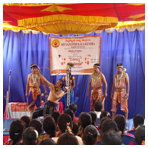 Another play based on popular story of Mahabharata based on the story of "Ekalavya" emphasizing one of the greatest maladies of our society casteism. The story carries an important message caste is not the criteria for learning and education. The theme of the play is education is the base of knowledge like air and light, education should be free, and it should available to all immaterial of caste and strata . The story of Ekalavya goes in the following sense. Ekalavya was born in a "so called low caste" and he goes to Dronachar to be his student but Dronachar rejected his offer as a student, since he belongs to the "so called low caste." But Ekalavya has taken the Guru in the mind and watching the Guru teaching bow and arrow to Brahmin students, he learnt bow and arrow by watching the teachings by the Guru to the Brahmin Students. His learning has excelled the students who learnt from the Guru Dronachar. The Guru comes to know of this excellent feature of Ekalavya and perturbed. In order to overcome the situation, Dronachar asked Ekalavya to cut his thumb as offering of Guru. Thumb is the main organ in the art of bow and arrow. As per the wish of the Guru Ekalavya cut his thumb and offered to Guru as the offering. After offering the thumb of the right hand he started using left hand for the bow and arrow.
Another play based on popular story of Mahabharata based on the story of "Ekalavya" emphasizing one of the greatest maladies of our society casteism. The story carries an important message caste is not the criteria for learning and education. The theme of the play is education is the base of knowledge like air and light, education should be free, and it should available to all immaterial of caste and strata . The story of Ekalavya goes in the following sense. Ekalavya was born in a "so called low caste" and he goes to Dronachar to be his student but Dronachar rejected his offer as a student, since he belongs to the "so called low caste." But Ekalavya has taken the Guru in the mind and watching the Guru teaching bow and arrow to Brahmin students, he learnt bow and arrow by watching the teachings by the Guru to the Brahmin Students. His learning has excelled the students who learnt from the Guru Dronachar. The Guru comes to know of this excellent feature of Ekalavya and perturbed. In order to overcome the situation, Dronachar asked Ekalavya to cut his thumb as offering of Guru. Thumb is the main organ in the art of bow and arrow. As per the wish of the Guru Ekalavya cut his thumb and offered to Guru as the offering. After offering the thumb of the right hand he started using left hand for the bow and arrow.
Street plays
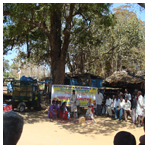 Street plays are interesting, popular art form due to simplicity, economics of resources and more than anything spontaneity of the performance. This art form is not only popular in villages but equally popular in major cities also. The street plays were organized in number of location to highlight social issues like alcoholism, primary health, etc. We choose places like village market, pilgrimage places etc, where people gather in good number and have time so that, they can watch the play leisurely and get its message.
Street plays are interesting, popular art form due to simplicity, economics of resources and more than anything spontaneity of the performance. This art form is not only popular in villages but equally popular in major cities also. The street plays were organized in number of location to highlight social issues like alcoholism, primary health, etc. We choose places like village market, pilgrimage places etc, where people gather in good number and have time so that, they can watch the play leisurely and get its message.
One such street play titled Echara play was based on the life of farmer who wants to dig a well. He approached the bank and fulfilled all the formalities at the bank. One of the formalities being approval by Village Accountant and Engineer. Village Accountant and Engineer made the approval and took money from the bank only a meager amount was given to the farmer with which he cannot be dig the well. The farmer has a son who has finished schooling and entered college but could not continue the studies due to family economic situation and he was rendered unemployed. The problems of unemployed were also highlighted in the play. But the bank has sent the installment notice to the farmer for the so called digging the well.
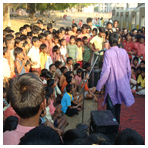 The farmer took the money from the Village Accountant and Engineer and given as a dowry for the daughter and married her off. When the bank sent the notice regarding the installment the farmer approached the lawyer, the lawyer advised to file the complaint about the loss of the well with the police. Accordingly the farmer lodges the complaint with the police of loss of the well. This brings out the folly of the farmer in lodging the complaint regarding the loss of the well to the police. For misguiding the farmer and involving in corrupt practices both Engineer and the Village Accountant were arrested and put behind the bar. The Street play was performed in Dobspet bus stand Tumkur district, weekly market at Nelamangala, Shivagange and Sri Ghati Subramanya - popular pilgrimage places in Tumkur and Kolar district respectively. The above street play was witnessed by around 2500 members of the community in four locations and appreciated the performance of the artists of Divya Jyothi Kala Kendra.
The farmer took the money from the Village Accountant and Engineer and given as a dowry for the daughter and married her off. When the bank sent the notice regarding the installment the farmer approached the lawyer, the lawyer advised to file the complaint about the loss of the well with the police. Accordingly the farmer lodges the complaint with the police of loss of the well. This brings out the folly of the farmer in lodging the complaint regarding the loss of the well to the police. For misguiding the farmer and involving in corrupt practices both Engineer and the Village Accountant were arrested and put behind the bar. The Street play was performed in Dobspet bus stand Tumkur district, weekly market at Nelamangala, Shivagange and Sri Ghati Subramanya - popular pilgrimage places in Tumkur and Kolar district respectively. The above street play was witnessed by around 2500 members of the community in four locations and appreciated the performance of the artists of Divya Jyothi Kala Kendra.
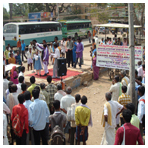 Another Street play was performed in four locations viz Kyathasandra, Magadi, Kortagere, and Tumkur Town with the theme "Hasire Nammellare Usiru." The play brings out the importance of nature and dichotomy between rural and urban life. The play is based on a couple depicting rural life where wife asks husband to return to the village. The husband resists return to the village but mentions about the film theaters in the town, pubs and bars in the towns. The wife develops incessant cough and she was referred to a doctor. The doctor advises her about the pollution in the town and other problem in the town which causes the cough. He advises to plant trees in front of the house to create and bring back the greenery which prevailed earlier.
Another Street play was performed in four locations viz Kyathasandra, Magadi, Kortagere, and Tumkur Town with the theme "Hasire Nammellare Usiru." The play brings out the importance of nature and dichotomy between rural and urban life. The play is based on a couple depicting rural life where wife asks husband to return to the village. The husband resists return to the village but mentions about the film theaters in the town, pubs and bars in the towns. The wife develops incessant cough and she was referred to a doctor. The doctor advises her about the pollution in the town and other problem in the town which causes the cough. He advises to plant trees in front of the house to create and bring back the greenery which prevailed earlier.
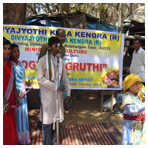 Title of another street play was "Arogya Jagruthi" created around married couple living in a joint family. The wife was pregnant and discussing with her husband about the delivery. She wanted to go to the hospital but the husband said that for ages this house has seen so many deliveries. "I was born here my father and were grandparents were born in this house only" and he emphasized that no need to go the hospital. After a spat, couple went to the hospital and consulted the doctor. The doctor suggested that fruits, vegetables, and greens should be taken for nutrition by the pregnant women. The lady delivers the baby in the hospital, it was a normal delivery. After the delivery the doctor suggested that timely food, milk and other supplements. Adhering to doctor's advice the mother takes the doctors suggestion seriously and took all the supplements and brings up a healthy child. This drama was enacted at Sugganahally Santhe Mydana, Kudur Hobli, Magadi Taluk, Arasanakunte, Solur Hobli, Magadi Taluk, Kunigal Bus Stand, Kunigal Town, and Yediyur Sidhalingeshwara Temple.
Title of another street play was "Arogya Jagruthi" created around married couple living in a joint family. The wife was pregnant and discussing with her husband about the delivery. She wanted to go to the hospital but the husband said that for ages this house has seen so many deliveries. "I was born here my father and were grandparents were born in this house only" and he emphasized that no need to go the hospital. After a spat, couple went to the hospital and consulted the doctor. The doctor suggested that fruits, vegetables, and greens should be taken for nutrition by the pregnant women. The lady delivers the baby in the hospital, it was a normal delivery. After the delivery the doctor suggested that timely food, milk and other supplements. Adhering to doctor's advice the mother takes the doctors suggestion seriously and took all the supplements and brings up a healthy child. This drama was enacted at Sugganahally Santhe Mydana, Kudur Hobli, Magadi Taluk, Arasanakunte, Solur Hobli, Magadi Taluk, Kunigal Bus Stand, Kunigal Town, and Yediyur Sidhalingeshwara Temple.
Another such play with objective to inculcate the importance of hospital and adhering to the suggestion of the doctor. The street play was titled "Arogya Jagruthi."
National level art camp
 The classical fine arts like painting are an important and popular art form since time immemorial. To promote, encourage and provide exposure to the budding artists in this art form, Kala Kendra has conducted Painting exhibition, symposiums, workshop at various places in Karnataka State. Apart from encouraging the artists, this programme also provides opportunity for them to learn nuances, intricacies, the real meaning of the art from the Masters and veterans of the field. Brief activities on this effort is as follows:
The classical fine arts like painting are an important and popular art form since time immemorial. To promote, encourage and provide exposure to the budding artists in this art form, Kala Kendra has conducted Painting exhibition, symposiums, workshop at various places in Karnataka State. Apart from encouraging the artists, this programme also provides opportunity for them to learn nuances, intricacies, the real meaning of the art from the Masters and veterans of the field. Brief activities on this effort is as follows:
 Our center organized a State level drawing and painting camp in association with Tumkur University at Tumkur sponsored by Kannada and culture Dept of Government of Karnataka in the premises of Sri Siddharatha Rural High school, Tumkur from 29th to 31st May 2009. Around 25 painters participated in the workshop. During the workshop, we organized a symposium to brief the participants about the nuances of the art of painting, its objectives, inner meaning etc. Sri K.T.Shivaprasad, distinguished artists inaugurated the workshop. During the workshop, we honored Sri B.Shivanand - a Lalit Kala Academy winner.
Our center organized a State level drawing and painting camp in association with Tumkur University at Tumkur sponsored by Kannada and culture Dept of Government of Karnataka in the premises of Sri Siddharatha Rural High school, Tumkur from 29th to 31st May 2009. Around 25 painters participated in the workshop. During the workshop, we organized a symposium to brief the participants about the nuances of the art of painting, its objectives, inner meaning etc. Sri K.T.Shivaprasad, distinguished artists inaugurated the workshop. During the workshop, we honored Sri B.Shivanand - a Lalit Kala Academy winner.
 Our center organized exhibition of painting from 8th July to 10th July 2010 at Belgaum. This event was supported by Kannada and Culture Department of State Government. The event was presided by Smt. Ekroop Kaur, Deputy Commissioner, Belgaum District and others who gave input and leadership to the training are Sri. Chendrasheker- Artist- Former Chairman of Chitrakala Parishad, Sri. Chendrasheker Kusanur, Senior Literature and Sri.K.B. Sidhaiah Poet, Dr Saraju Kaktkar, Sri C.Chandrasekhar, Dr Ramakrishna Marathe participated in the symposium organized during the exhibition.
Our center organized exhibition of painting from 8th July to 10th July 2010 at Belgaum. This event was supported by Kannada and Culture Department of State Government. The event was presided by Smt. Ekroop Kaur, Deputy Commissioner, Belgaum District and others who gave input and leadership to the training are Sri. Chendrasheker- Artist- Former Chairman of Chitrakala Parishad, Sri. Chendrasheker Kusanur, Senior Literature and Sri.K.B. Sidhaiah Poet, Dr Saraju Kaktkar, Sri C.Chandrasekhar, Dr Ramakrishna Marathe participated in the symposium organized during the exhibition.
DIVYA JYOTHI KALA KENDRA- NELAMANGALA
L. Krishna Murthy, President of DivyaJyothi Vidya Kendra told about the main intention and aim of this camp. This camp is organized for youths to create the interest about art, literature, culture, fine arts, drama. By this it is possible to lead the life with adjusting nature in the society. If the students follow this way of life the aim of goal will be gained. Having this view, the youths are encouraged and are given suitable chances to improve their of futures. In the inaugural function of the Fine Art Camp, Dr. Mylanahalli Revanna, K. Ravi, Muninarasaiah, Munihobalaiah and Jayarm were on the stage as special guests. Cultural Programmes were arranged in the camp Kum. Chandrika, kum. Shyamala performed Bharatha Natya and Radio artist Sangeetha Kakhanadaki presented a beautiful light music programme. The programme came an end after the vote of thanks by collge lecturer Umashankar.
On 4th September 2011, in the morning session, the programme was started with light music concept by Rama Chandra Shakaladevanapura at 11.30 am, poet's meet enlightened and party the stage. In¬ the poet's meet, so many senior and junior poets participated and read their, poems in a systematic way. Then the poets were felicitated honoring by Mysore Peta.
At 12.30 p.m. Seminar was started. The theme of Seminar was 'internal discipline'. The participants were A.R. Ramananda, M.V. Negaluru, B.M. Jagadish, Smt. Renukamma, Smt. Akka Mahadevi, Prasad and Prakash. The participants explained their own views about the subject of seminar.
The presidential speech was by A.R. Ramananda. He told that the meaning of internal discipline. How we can not consider each and every part of human body separate, the literature, culture fine arts, culture etc, can also not be considered individually. After his words the camp came to an end. In this camp 5 artists created fine arts demanding the viewers to consider their views. This became the high lights of the seminar.
The artists were felicitated and awarded by giving certificates and mementos. Considering all these facts, there was no doubt is saying the fine arts camp became very successful and so many people participated of in the camp. These types of camps should be arranged everywhere. This was the opinion of the public participated in the camp.
'From education civilized Society is created'hundred this of headline, the Indian culture and tradition were the models of the whole world. But in the name of globalization, western culture is penetrating by this, today and tomorrows have created so many problems. The regretted words of Dr. Aravinda Malgathi made the people to think the other side of the problem.
Venkatesh R. Chowathai anchored the function; vote of thanks was by Umashankar. In the fine art camp, the procession of cultural teams was unforgettable. Magic idol, band set, Somana Kunitha, Thamate Dollu Kunitha (Traditional) were the highlights of the procession. At this time the members staff of the were felicitated and given mementos end of the programme.
Neladani Community radio Station
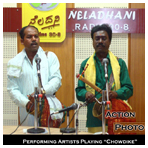 Unfortunately due to onslaught by Western influence, our great cultural heritage of various art forms particularly the folklore is fast becoming extinct. To preserve and nurture these art forms for posterity, the Cultural wing of the Kendra under the auspices of Kala Kendra is organizing number of workshops, events, training courses in the field of fine arts, various forms of. An exclusive cultural troupe is a part of staff of Divyajyothi Vidya Kendra. This troupe intervenes, performs, and depicts the issues and problems of the society with objective of creating awareness and initiating corrective action. This cultural troupe performs street plays and stage plays themes which impede the development of society. Currently the troupe has 7 artists in the team. We have infrastructural facilities for conducting training, equipments and own office. Our activities are well supported by philanthropists, Ministry of Culture, Government of India, Department of Kannada and Culture, Government of Karnataka, local bodies, Universities, educational institutions, reputed societies like Chitra Kala Parishad, Civil Society, Village Panchayat etc. Brief report on these activities is as follows.
Unfortunately due to onslaught by Western influence, our great cultural heritage of various art forms particularly the folklore is fast becoming extinct. To preserve and nurture these art forms for posterity, the Cultural wing of the Kendra under the auspices of Kala Kendra is organizing number of workshops, events, training courses in the field of fine arts, various forms of. An exclusive cultural troupe is a part of staff of Divyajyothi Vidya Kendra. This troupe intervenes, performs, and depicts the issues and problems of the society with objective of creating awareness and initiating corrective action. This cultural troupe performs street plays and stage plays themes which impede the development of society. Currently the troupe has 7 artists in the team. We have infrastructural facilities for conducting training, equipments and own office. Our activities are well supported by philanthropists, Ministry of Culture, Government of India, Department of Kannada and Culture, Government of Karnataka, local bodies, Universities, educational institutions, reputed societies like Chitra Kala Parishad, Civil Society, Village Panchayat etc. Brief report on these activities is as follows.
Neladani -90.8FM programmes
- 1) Tital Song Neladani Neladani
- 2) Maathumanikya (Chintane)
- 3) Chitraranjini
- 4) Adugemane
- 5) Arogyabelaku
- 6) Naadakanmani
- 7) Guruganga (vivekavaani)
- 8) Bhavaspandana
- 9) JanapadaLoka
- 10) Chinnaraloka
- 11) Bandhavyada Besuge
- 12) Shikshanabelaku
- 13) Rangageetegalu
- 14) Krushibelaku






